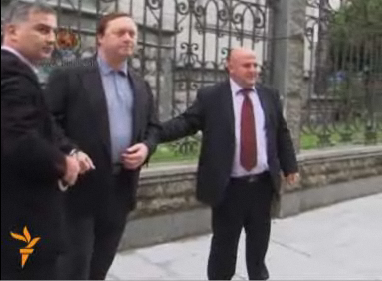Big news out of Georgia (which is where I am until 17 November), where thirteen men were arrested on charges of spying for Russia, Georgia’s nemesis. Most of the men were arrested in October, and the Ministry of Internal Affairs made the announcement on 5 November, perhaps due to Reuters breaking the story a week earlier.
The MIA said that four of the suspects are Russian citizens, with the rest Georgians, including six “army pilots.” Others include a sailor, a hotel manager from Batumi, and a man described as a founder of the NGO “Globalization Institute.”
Pro-government TV station Rustavi 2 obtained footage, taken by the MIA, of some of the arrests, shown on the Friday evening news. Interestingly, the suspects appear rather unfazed during their sudden arrests on espionage charges.

Two of the Russians (one of whom was arrested in May and has already been convicted of forgery) worked for Saybolt, a division of Houston-based Core Laboratories, which specializes in petroleum engineering.
If the allegations are true, the arrests are a major coup for Georgian counter-intelligence. The Ministry announced that it had “planted a former Soviet Army officer into the GRU, who gained trust of the Russian Military Intelligence and started to work for this agency as a liaison officer.”
So apparently, the Georgians used a mole inside the GRU (Russian military intelligence), who fed the MIA information about the Russian spy ring.
The spy network had been operational “for years,” according to the Georgian authorities, who said that they had begun to crack the spy ring after a general amnesty was declared in 2006 for any Georgian citizen who had collaborated with Russian intelligence.
MIA spokesman Shota Utiashvili told the press that the spy network passed information to Russia before and during Georgia’s disastrous 2008 war with its northern neighbor, resulting in the Russian military seizing control of two Georgian provinces, both of which have since declared independence.
Georgia has long accused Russia of operating spy networks in the country, with a litany of arrests and recriminations (and retaliation in one form or another) from Moscow. In the autumn of 2006, Georgian authorities arrested four Russian military intelligence officers and charged them with espionage. The crisis that ensued included the recall of the Russian ambassador and the withdrawal of Russian diplomats from Tiblisi, and the humiliating return of the alleged Russian spies to their homeland in a deal brokered by the Organization for Security and Cooperation in Europe (OSCE).
Russian Deputy Foreign Minister Grigory Karasin referred to the alleged spy scandal as a political “farce.” The Ministry said that “Mikheil Saakashvili’s regime suffers from chronic anti-Russian spy mania,” adding that the Georgian government “has repeatedly resorted to fabrication of such scandals, cynically hoping to receive domestic or foreign dividends.”
Yesterday, Russian Foreign Minister Sergei Lavrov demanded consular access to the Russians said to have been detained: “We want to make sure that the detainees are our citizens.”
The Georgoan government said that they were willing to negotiate regarding the repatriation of the Russians, but Lavrov rejected the idea of negotiations, and called the arrests “a provocation.”
More arrests may be in the offing, with the Georgian government hinting that other agents were still at large.